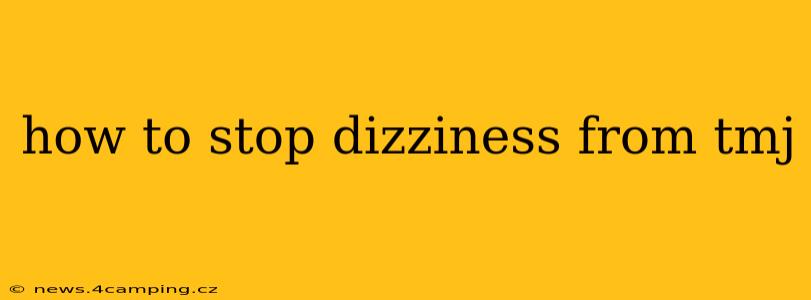Temporomandibular joint (TMJ) disorder can cause a wide range of symptoms, and dizziness is a surprisingly common one. The connection isn't always immediately obvious, but the intricate network of nerves and muscles in the head and neck means TMJ problems can easily affect balance and spatial orientation. This guide explores the link between TMJ and dizziness, offering practical strategies for managing and potentially alleviating this debilitating symptom.
What is the Link Between TMJ and Dizziness?
The connection between TMJ and dizziness stems from the close proximity of the temporomandibular joint to the inner ear and brainstem. Misalignment or dysfunction in the TMJ can:
- Affect the vestibular system: This system in the inner ear is responsible for balance and spatial awareness. TMJ issues can trigger inflammation and nerve irritation, disrupting the vestibular system's function and leading to dizziness, vertigo, and imbalance.
- Trigger cervicogenic dizziness: This type of dizziness originates from problems in the neck, which are often interconnected with TMJ disorders. Muscle tension, misalignment, and inflammation in the neck can affect the blood supply to the brain and the nerves responsible for balance.
- Increase tension headaches: TMJ disorders frequently cause headaches, and severe headaches can themselves induce dizziness. The pressure and pain can disrupt normal neurological function.
How Can I Tell if My Dizziness is Caused by TMJ?
Differentiating between dizziness caused by TMJ and other conditions requires a thorough evaluation by a healthcare professional. However, some common indicators that dizziness might stem from TMJ include:
- Dizziness worsening after jaw movements: Chewing, yawning, or talking might exacerbate the dizziness.
- Dizziness accompanied by TMJ symptoms: This includes jaw pain, clicking or popping in the jaw, headaches, and earaches.
- Relief from jaw adjustments: If gentle jaw manipulation or adjustments provide temporary relief from dizziness, it suggests a potential link.
- Dizziness improving with TMJ treatment: Response to TMJ treatments like physical therapy, splints, or medication could indicate a causal relationship.
It's crucial to consult a doctor or dentist specializing in TMJ disorders for a proper diagnosis. They can rule out other potential causes of dizziness, such as inner ear infections, neurological conditions, or cardiovascular issues.
What are Some Effective Ways to Stop Dizziness from TMJ?
Managing dizziness related to TMJ often requires a multifaceted approach. Treatment plans are tailored to individual needs but frequently incorporate the following strategies:
1. TMJ-Specific Therapies:
- Physical therapy: Exercises designed to improve jaw mobility, strengthen supporting muscles, and reduce tension can significantly alleviate dizziness.
- Oral splints (mouthguards): These appliances help realign the jaw and reduce stress on the joint, potentially easing dizziness.
- Medications: Pain relievers, muscle relaxants, and anti-inflammatory drugs can manage pain and inflammation, indirectly improving dizziness.
- Injections: Corticosteroid injections into the TMJ can reduce inflammation and provide temporary relief.
2. Lifestyle Modifications:
- Stress management: Stress can exacerbate TMJ symptoms, including dizziness. Techniques like meditation, yoga, or deep breathing can help.
- Dietary adjustments: Avoid hard-to-chew foods that put strain on the jaw.
- Improved posture: Maintaining good posture reduces strain on the neck and jaw.
- Gentle jaw exercises: Specific exercises can improve jaw mobility and reduce tension.
3. Complementary Therapies:
Some individuals find relief from complementary therapies such as:
- Acupuncture: This technique may help reduce pain and inflammation.
- Massage therapy: Massage can alleviate muscle tension in the jaw and neck.
- Chiropractic care: Chiropractic adjustments may improve spinal alignment and reduce neck pain, which can contribute to dizziness.
What Other Questions Should I Ask My Doctor?
Patients often have additional concerns beyond the basics. Here are some questions you might consider asking your healthcare professional:
What are the potential long-term effects of untreated TMJ-related dizziness?
Ignoring TMJ-related dizziness can lead to chronic dizziness, increased pain, and functional limitations in daily life. It's essential to seek timely treatment to prevent long-term complications.
What are the different types of TMJ treatment options available, and which one is best for me?
Treatment options vary depending on the severity of the condition and individual needs. Your doctor will help determine the most suitable approach for your specific situation.
How long will it take to see improvement in my dizziness after starting treatment?
The timeframe for improvement varies considerably depending on the severity of the TMJ disorder and the chosen treatment method. Patience and consistent adherence to the treatment plan are crucial.
Are there any potential side effects associated with TMJ treatments?
As with any medical intervention, TMJ treatments carry potential side effects. Your healthcare provider will discuss these risks and benefits before recommending any treatment.
Addressing dizziness stemming from TMJ requires a comprehensive and individualized approach. By working closely with a healthcare professional, you can develop a treatment plan to effectively manage your symptoms and improve your overall quality of life. Remember, early intervention is key to minimizing long-term complications.
